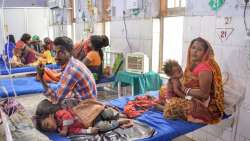AIIMS Delhi to launch research to find exact cause of encephalitis
The syndrome is currently listed under the 'unknown category'.

The All India Institute of Medical Sciences, Delhi is set to study and research into the actual cause behind Acute Encephalitis Syndrome -- which has been responsible for the deaths of over 120 children in Bihar's Muzaffarpur.
The syndrome is currently listed under the 'unknown category'.
The project is scheduled to begin next month and is funded by the Union Ministry of Health and Family Welfare and India Infrastructure Finance Company Limited (IIFCL) as part of a CSR activity.
The Centre of Excellence Advanced Research For Childhood Neurodevelopmental Disorders, AIIMS, will be looking after 11 projects to find out how these acute and sub-acute AES syndromes are caused.
"Every year, the mortality rate [due to AES] goes high. This study would help us to know the exact cause behind this," Professor Sheffali Gulati, Chief of Child Neurology Division, Department of Paediatrics told ANI.
He added, "We will do a plethora of tests and cover most of the viruses, bacteria, fungi, parasites and autoimmune disorders. To deal with cases caused by intake of litchi, we may add a metabolic screen to understand the aetiology comprehensively."
"The cases of AES might be linked to litchi but the disease can be caused by a whole plethora of infections. Children, who are getting affected due to AES, are mostly malnourished. They go to the field and eat the unripe fruit. Unripe litchis contain toxins that can cause extremely low blood sugar. They do not have glycogen reserve. The hot weather adds to the loss of water in litchis," Gulati futher said.
Meanwhile, the death toll due to AES in Muzaffarpur continues to be on a rise. According to the information received as on Sunday, 129 children have so far died due to AES, out of which 109 have died in Muzaffarpur's SKMCH, while 20 casualties have been reported from Kejriwal hospital.
Cases highlighting negligence on the part of doctors have also come to light. According to news agency ANI, senior resident Doctor of SKMCH, Dr Bhimsen Kumar, has been suspended for negligence of duty.
The Health Department had deployed the Patna Medical College and Hospital (PMCH) pediatrician at SKMCH on June 19.
The brain fever has spread to 16 districts of the state.
(with inputs from agencies)